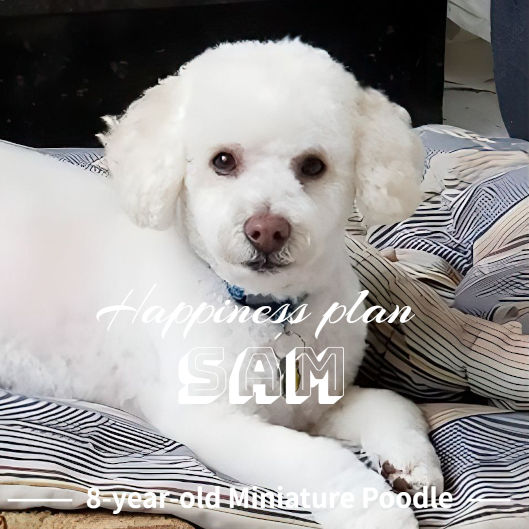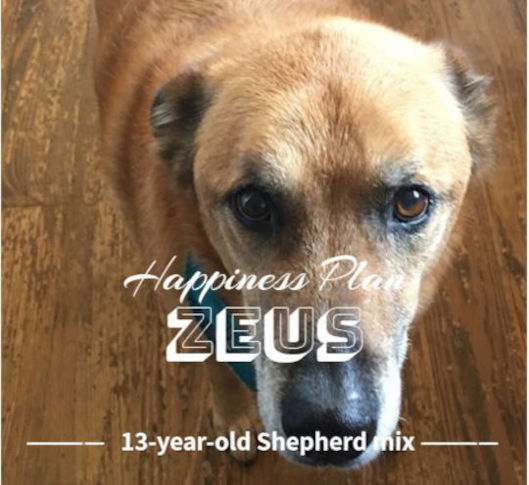This article was updated on November 8th, 2023
In this Happiness Plan, we’ll take a look at Sam, an older Miniature Poodle.
Our dog training and behavior experts Julie Burgess (CPDT-KA) and Mindy Waite (Ph.D., CAAB) have assessed Sam’s profile, taking into account his age, breed, temperament, lifestyle and preferences.

A Customized Plan for Sam, an 8-year-old Miniature Poodle
Sam’s profile
Sam’s current owner took him in when her mom passed away. Here are some of Sam’s special traits:
- Sam is now a moderately active dog, but that wasn’t always the case.
- He loves playing with his housemate, but not other dogs.
- Sam doesn’t play with a lot of toys as he is extremely picky and prefers fluffy toys.
Lifestyle
Sam stays at home with his female owner who works from home, while his male owner has a job outside the house. The owner has a flexible job so taking potty and play breaks is easy.
A few years ago, Sam started gaining weight and the owner had bloodwork done and discovered Sam is hypothyroid. With the help of thyroid supplements, Sam has lost weight and is back to being moderately active.
Happiness plan for Sam
Introduce a new game: Find Lambchop
Over time, Sam’s owner has discovered that he prefers plush toys like this Lambchop. To encourage Sam to be more active, we can add a game of hide and seek with Lambchop and a treat.
Start by having Sam in a sit/stay position, show him Lambchop, and then hide it in full view. Give him a release word like “ok,” and have Sam go get Lambchop. Use tiny pieces of treats around Lambchop to encourage Sam to go find his toy. You can also play the same game with food as it will encourage him to use his nose. Using the nose is both more fun and more relaxing than using visuals.
Using that nose
As an older dog, Sam could feel better with daily gentle stretching and brain games. To easily combine these two, feed Sam his daily meals from a snuffle mat. This not only requires him to search for food using his nose (a beloved pastime for most dogs!), but it also incorporates standing and stretching movements for his neck, legs, and spine.
Walks
Poodles are extremely smart, so Sam would benefit from two 30-minute walks daily. It is best if you vary your route each time so that Sam gets a lot of opportunities to explore his environment. Remember to go slow, so that Sam can really take it all in by sniffing and sightseeing.
While Sam is savoring the walk, you can take this as an opportunity to slow down, be present with him, and fully open up your senses to enjoy your own mindful walk. If Sam is slowing down on his walks, you can start slowly incorporating strollers for him so he can continue to “walk” with you into his very senior years, thus maximizing long-term happiness.
Petting and relationship with the owner
Sam enjoys hanging out with his owners at night, but they would rather he sleep on his own bed. To ensure Sam’s social needs are met, you can train Sam to request attention in a polite way. For example, he could be trained to push a button, ring a bell, sit in front of you with a toy in his mouth, etc. Contingent on this behavior, you give him 5 minutes of petting, praise, or play.
To keep him in his own bed at night, have short training sessions of 3-5 minutes where you work on “place” with Sam so that he can still be near you but will not be on the furniture.
Start by ensuring Sam’s bed is comfortable. Many older dogs feel better with well-supported orthopedic beds. Walk over to his bed and toss a few small treats onto it and repeat several times. Next, walk over to his bed and give him the command “place” or “bed.” Whenever Sam goes onto his bed, give Sam a treat so he is more likely to go there again in the future.
Discover more happiness plans
Read more happiness plans.


Disclaimer: This website's content is not a substitute for veterinary care. Always consult with your veterinarian for healthcare decisions. Read More.



Be the first to comment